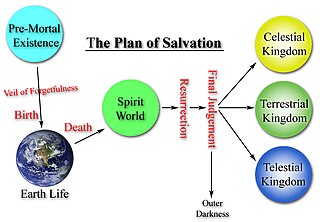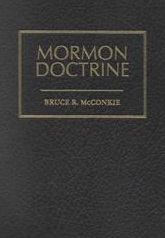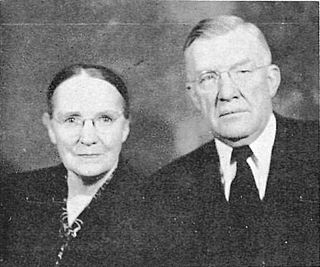See also
- McConkie Tauasa, rugby league player who plays as a centre or on the wing
McConkie is a surname. Notable people with the surname include:
During the history of the Latter Day Saint movement, the relationship between Black people and Mormonism has included enslavement, exclusion and inclusion, official and unofficial discrimination, and friendly ties. Black people have been involved with the Latter Day Saint movement since its inception in the 1830s. Their experiences have varied widely depending on the specific denomination within Mormonism, and the time in history of their involvement. From the mid-1800s to 1978, Mormonism's largest denomination, the Church of Jesus Christ of Latter-day Saints barred Black women and men from participating in ordinances of its temples necessary for the highest level of salvation, prevented most men of Black African descent from being ordained to the church's lay, all-male priesthood, supported racial segregation in its communities and schools, taught that righteous Black people would be made White after death, and opposed interracial marriage. The temple and priesthood racial restrictions were lifted by top leaders in 1978. In 2013 the church disavowed its previous teachings on race for the first time.

Spencer Woolley Kimball was an American business, civic, and religious leader who was the twelfth president of the Church of Jesus Christ of Latter-day Saints. The grandson of early Latter-day Saint apostle Heber C. Kimball, Kimball was born in Salt Lake City, Utah Territory. He spent most of his early life in Thatcher, Arizona, where his father, Andrew Kimball, farmed and served as the area's stake president. He served an LDS mission in Independence, Missouri, from 1914 to 1916, then worked for various banks in Arizona's Gila Valley as a clerk and bank teller. Kimball later co-founded a business selling bonds and insurance that, after weathering the Great Depression, became highly successful. Kimball served as a stake president in his hometown from 1938 until 1943, when he was called as a member of the Quorum of the Twelve Apostles.

Bruce Redd McConkie was a member of the Quorum of the Twelve Apostles of the Church of Jesus Christ of Latter-day Saints from 1972 until his death. McConkie was a member of the First Council of the Seventy of the LDS Church from 1946 until his calling to the Quorum of the Twelve Apostles.

Blood atonement is a disputed doctrine in the history of Mormonism, under which the atonement of Jesus does not redeem an eternal sin. To atone for an eternal sin, the sinner should be killed in a way that allows his blood to be shed upon the ground as a sacrificial offering, so he does not become a son of perdition. The largest Mormon denomination, the Church of Jesus Christ of Latter-day Saints, has denied the validity of the doctrine since 1889 with early church leaders referring to it as a "fiction" and later church leaders referring to it as a "theoretical principle" that had never been implemented in the LDS Church.
The law of chastity is a moral code defined by the Church of Jesus Christ of Latter-day Saints. According to the church, chastity means that "sexual relations are proper only between a man and a woman who are legally and lawfully wedded as husband and wife." Therefore, abstinence from sexual relations outside of marriage, and complete fidelity to one's spouse during marriage, are required. As part of the law of chastity, the church teaches its members to abstain from adultery and fornication.
The law of consecration is a commandment in the Latter Day Saint movement in which adherents promise to dedicate their lives and material substance to the church. It was first referred to in 1831 by Joseph Smith.

In the Mormon theology and cosmology there are three degrees of glory which are the ultimate, eternal dwelling place for nearly all who lived on earth after they are resurrected from the spirit world.
Charles Winston Dahlquist II is an American attorney and youth leader. He was the 20th Young Men General President of the Church of Jesus Christ of Latter-day Saints from 2004 to 2009, and was the 10th National Commissioner of the Boy Scouts of America from 2016 to 2018.

Mormon Doctrine is an encyclopedic work written in 1958 by Bruce R. McConkie, a general authority of the Church of Jesus Christ of Latter-day Saints. It was intended primarily for a Latter-day Saint audience and has been used as a reference book by church members because of its comprehensive nature, and was a highly influential all-time bestseller in the LDS community. It was viewed by many members both then and now as representing official doctrine despite never being endorsed by the church. It has been both heavily criticized by some church leaders and members and well regarded by others. After the book's first edition was removed from publication at the instruction of the church's First Presidency and Quorum of the Twelve, corrections were made in subsequent editions. The book went through three editions but has been out of print since 2010.
Mormons have both used and been subjected to significant violence throughout much of the religion's history. In the early history of the United States, violence was used as a form of control. Mormons were violently persecuted and pushed from Ohio to Missouri, from Missouri to Illinois and from Illinois, they were pushed west to the Utah Territory. There were incidents of massacre, home burning and pillaging, followed by the death of their prophet, Joseph Smith. Smith died from multiple gunshot wounds from a lynch mob at a jail in Carthage, Illinois; Smith had defended himself with a small pistol smuggled to him by church leader Cyrus Wheelock and he was then shot while trying to flee from a window. There were also notable incidents in which Mormons perpetrated violence. Under the direction of Mormon prophets and apostles, the Mormon burned and looted Davies County, attacked and killed a member of the Missouri state militia, and carried out an extermination order on the Timpanogos. Other Mormon leaders led the Mountain Meadows Massacre, Battle Creek massacre, and Circleville Massacre. Mormons have also been a major part in several wars, including the 1838 Mormon War, Walker War and Black Hawk War.

John Thomas Fyans was a general authority of the Church of Jesus Christ of Latter-day Saints from 1974 until his death.
The 1978 Revelation on Priesthood was an announcement by leaders of the Church of Jesus Christ of Latter-day Saints that reversed a long-standing policy excluding men of Black African descent from the priesthood and both Black men and women from priesthood ordinances in the temple. Leaders stated it was a revelation from God.
The Church of Jesus Christ of Latter-day Saints takes no official position on whether or not biological evolution has occurred, nor on the validity of the modern evolutionary synthesis as a scientific theory. In the twentieth century, the First Presidency of the LDS Church published doctrinal statements on the origin of man and creation. In addition, individual leaders of the church have expressed a variety of personal opinions on evolution, many of which have affected the beliefs and perceptions of Latter-day Saints.
George Wendell Pace was an American professor of religion at Brigham Young University (BYU) in Provo, Utah. He was a popular writer and speaker on religion in The Church of Jesus Christ of Latter-day Saints and part of a public criticism voiced by Apostle Bruce R. McConkie in 1982.
Bookcraft was a major publisher of books and products for members of the Church of Jesus Christ of Latter-day Saints.

Oscar Walter McConkie was a Utah State Senator and leader in the Church of Jesus Christ of Latter-day Saints. He was the father of Bruce R. McConkie, a member of the Quorum of the Twelve Apostles of the LDS Church. A second son, Oscar W. McConkie, Jr., was a member of the Utah State Senate.
Oscar Walter McConkie Jr. was an American politician and attorney in Utah and leader in the Church of Jesus Christ of Latter-day Saints. He was the president of the Utah State Senate from 1965 to 1966, subsequently becoming the chairman of the law firm of Kirton McConkie. McConkie authored several popular books on Latter-day Saint subjects.
From 1852 to 1978, temple and priesthood policies in the Church of Jesus Christ of Latter-day Saints prohibited women and men of Black African descent from temple ordinances and ordination in the all-male priesthood. In 1978, the church's highest governing body, the First Presidency, declared in the statement "Official Declaration 2" that the restriction had been lifted. Between 1830 and 1852, a few Black men had been ordained to the Mormon priesthood in the Latter Day Saint movement under Joseph Smith.
David Merrill McConkie is an American lawyer and was a member of the general presidency of the Sunday School of the Church of Jesus Christ of Latter-day Saints from 2009 to 2014.
Kirton McConkie is an American law firm based in Salt Lake City, Utah. It is notable for being the principal legal representative of the Church of Jesus Christ of Latter-day Saints. It is the largest law firm in Utah.